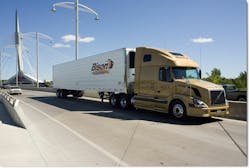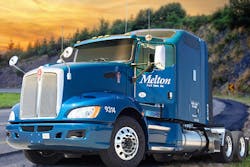KISSIMMEE, FL. Three fleet executives met here together in a morning panel discussion earlier this week at the Truckload Carriers Association annual convention to discuss creating a culture of safety. While they represented different carriers with different types of operations, they absolutely shared a commitment to “doing the right thing” every day for all the right reasons. And attendees were all ears as these executives shared their own experiences building a culture of safety—one step at a time.
Pat Kuehl, executive vice president, Great West Casualty Company, moderated the panel, which included Brian Fielkow, president, Jetco Delivery, Inc.; Rob Penner, executive vice president and COO, Bison Transport, Inc.; and Bob Peterson, president and CEO, Melton Truck Lines, a subsidiary of the Hawthorne Group.
Moderator Kuehl kicked off the session with his own observation: “My definition of culture is how things get done. What is yours?” Listen in:
Definition of culture:
Penner: Fleets have a culture whether it is intentional or not. If you want to see your culture, step back and see how things work when the company is under pressure. That’s your culture.
Fielkow: Culture must be leader-driven, but employee-owner. There comes a time when, if you can’t bring employees along [to buy into and support your vision], you have to let them move on. Know who your opinion leaders are and whether they are working for you or against you.
Penner: People equal 38 percent of our spend, but they create 100 percent of our value. The driver is not the only one we need to support our mission.
Creating a safety-based culture:
Fielkow: You have to get in front of your metrics. Customers more and more “get it” when it comes to safety; they are not indifferent anymore. A good safety culture is the ultimate way to say “respect” to drivers, which reduces turnover. The company culture is your “secret sauce”—your differentiation.Peterson: We have 26 employee shareholders now and we are Qualified, Self-Insured. There are only about 60 companies in the U.S. who are Qualified Self-Insured. That means we have huge risk exposure at every point. So why would we take risks? We feel this status supports our safety culture.
Penner: There is no book you can follow for how to establish a culture of safety. It all depends upon what you want and what/who you have to work with. Once you [size that up] then you can set out a very specific path to creating your culture of safety. It won’t happen overnight.
We used to have a “culture of compliance.” Then we joined TCA and competed for the fleet safety award; that turned the tide for us. It became our mechanism for change.
Getting good ideas out of the boardroom:
Fielkow: At Jetco, we created a company brand, ‘Driving to Perfection.” It is our internal brand and we let the employees choose it. You can’t get to their heads before you get to their hearts.
People have to understand their missions. Every month, we send a letter home to our drivers’ families. Families have to understand what drivers need. We also let our employees write our employee handbook, the operating manual (not including the legal requirements we must include, of course).
Peterson: We have a very vigorous wellness program at Melton. We lost two senior drivers to heart attacks and we asked ourselves, ‘What can we do?” In 2006, we hired a wellness manager and converted our smoking lounge into a gym.
Then we started assessing the health of our people on a voluntary basis. If they agreed to participate in the program, they received substantial breaks on their insurance costs. Now we also have a full-time nurse and a part-time nurse practitioner and doctor. Employees can bring their kids in for school physicals. We have also added a bigger gym and a service called “Compass,” which tells employees up front what medical procedures will cost them and cost the company.
When we began our wellness program, our costs went “straight up,” but now our healthcare costs are declining. We have had two years of declining healthcare costs and we have not cut benefits. In fact, we are now adding a dentist. We have really saved lives. But honestly, even if we were just treading water when it comes to costs, I’d still feel better [about what we are doing now].
Penner: We also created a company brand, “You’re Safe with Me.” Everyone now understands how they are connected and what that means [to each person and to the organization].
Carrots and sticks:
Fielkow: We don’t do “progressive discipline” now for minor things. Instead, we do coaching, which sits both the driver and the fleet on the same side of the table.
Peterson: We have huge exposure, so we just don’t keep unsafe drivers; they have to go. Even drivers with “bad attitudes” have to go. If they are not Melton material, they have to go. It quickly becomes very clear [how serious we are about safety].
Penner: Agree. You have to defend your culture or it becomes spin. It becomes fraudulent.
Safety technologies:
Peterson: We use quite a number of safety technologies, including tire inflation systems, EOBRs (electronic onboard recorders), lane departure devices, and in-cab cameras. We are also experimenting with active braking systems. I am 100 percent in favor of in-cab cameras. It is remarkable what you see. Our video system has more than paid for itself.
Audience members had plenty of questions following the panel, including whether or not small-sized fleets can also create cultures of safety in their operations. Fielkow did the honors summing things up on this key point: “Being a small-sized company is a benefit,” he observed. “You can be nimble and you can know everybody’s name.
“Small thinking, however, is not good, no matter what your fleet size. I do not agree that this process is out of the reach of smaller companies.”-
About the Author
Wendy Leavitt
Wendy Leavitt is a former FleetOwner editor who wrote for the publication from 1998 to 2021.

